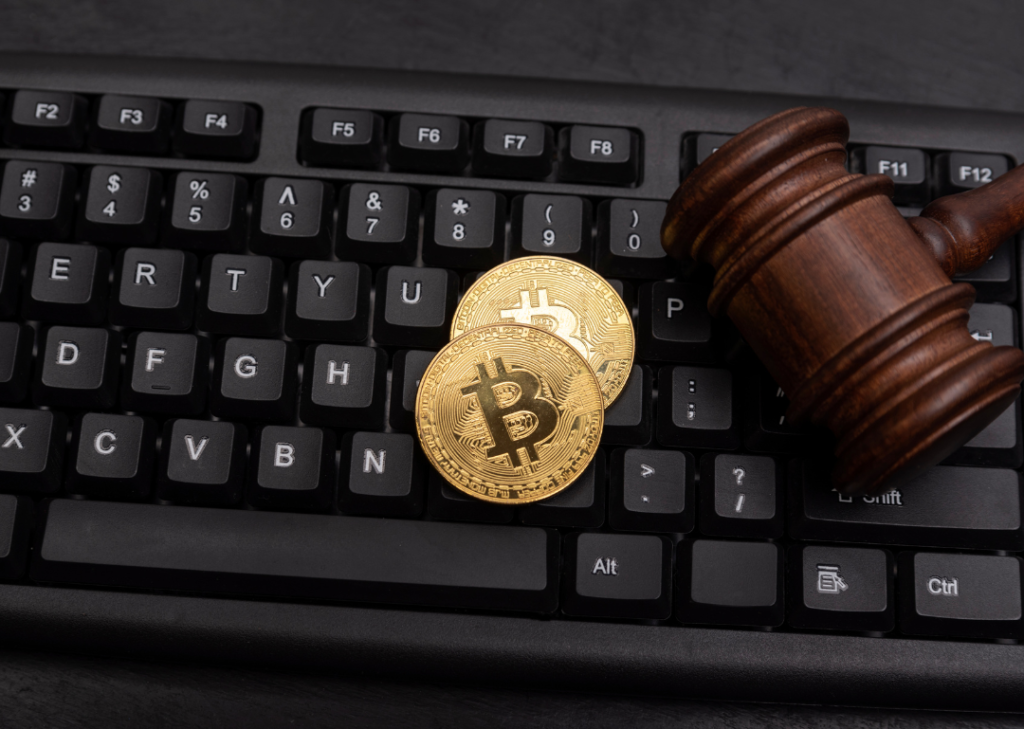Unlocking the world of cryptocurrencies, Bitcoin has emerged as a revolutionary digital currency. But what about its legality in the United Arab Emirates (UAE)? In this blog post, we will dive into the intriguing realm of Bitcoin and explore its standing within the UAE’s regulatory framework. Join us on this journey to uncover whether Bitcoin is legal or not in one of the most dynamic countries in the Middle East. So buckle up and let’s venture into the exciting world of virtual currencies. In this blog we will discuss about Is Bitcoin legal in the UAE.

Understanding Bitcoin and its legality
Understanding Bitcoin and its legality can be quite a complex subject, but fear not! We’re here to break it down for you. Bitcoin is a decentralized digital currency that operates on a technology called blockchain. Unlike traditional currencies issued by central banks, Bitcoin is not regulated or controlled by any government or financial institution.
Now, let’s address the burning question: Is Bitcoin legal in the UAE? Well, currently there are no specific laws or regulations that explicitly ban or legalize Bitcoin in the UAE. The regulatory landscape surrounding cryptocurrencies is still evolving globally and the UAE is no exception. However, this doesn’t mean that using Bitcoin is entirely unregulated in the country.
The UAE’s Securities and Commodities Authority (SCA) has issued warnings about investing in cryptocurrencies due to their volatile nature and potential risks. Additionally, some reports suggest that trading platforms facilitating cryptocurrency transactions may require licenses from relevant authorities.
It’s important to note that while there may not be explicit regulations regarding Bitcoin itself, existing laws related to money laundering, terrorism financing, and fraud are applicable when it comes to cryptocurrency transactions within the country.
So while it may seem like a grey area at present, individuals interested in using or investing in Bitcoin should exercise caution and stay informed about any developments regarding its legality within the UAE.

Current regulations on Bitcoin in the UAE
The United Arab Emirates (UAE) has been at the forefront of embracing new technologies, and it is no surprise that they have also taken an interest in cryptocurrencies like Bitcoin. However, when it comes to the legality of Bitcoin in the UAE, there are certain regulatory measures that individuals and businesses need to be aware of.
In 2017, the UAE government issued a statement clarifying its stance on virtual currencies. They stated that while they do not recognize cryptocurrencies as legal tender, they also do not prohibit their use or ownership. This means that individuals are free to buy, sell, and hold Bitcoin within the country.
However, this does not mean that there are no rules governing the use of Bitcoin in the UAE. The Central Bank of the UAE has emphasized caution when dealing with digital currencies due to concerns over money laundering and terrorist financing. As a result, commercial banks in the country have been advised to exercise enhanced due diligence when dealing with customers involved in cryptocurrency transactions.
Furthermore, any business operating within the UAE that wishes to accept Bitcoin as a form of payment must obtain appropriate licenses from relevant authorities such as the Dubai Multi Commodities Centre (DMCC) or Abu Dhabi Global Markets (ADGM).
Individuals and businesses alike need to stay updated on any changes or developments regarding cryptocurrency regulations to ensure compliance with local laws.
While Bitcoin is not recognized as a legal tender in the UAE, its use is allowed under certain guidelines and regulations set by authorities. It provides opportunities for innovation and financial inclusion but requires careful consideration due to potential risks associated with its decentralized nature.

Cryptocurrency market in the UAE
The cryptocurrency market in the UAE has witnessed significant growth and development in recent years. With its forward-thinking approach, the UAE government has embraced blockchain technology and is actively encouraging the use of cryptocurrencies like Bitcoin.
The UAE’s cryptocurrency market offers a range of opportunities for investors and businesses alike. The country has attracted numerous cryptocurrency exchanges, providing a platform for individuals to buy, sell, and trade digital currencies. These exchanges also offer additional services such as wallets and secure storage options.
One key factor contributing to the growth of the cryptocurrency market in the UAE is its favourable regulatory environment. The Securities and Commodities Authority (SCA) issued regulations in 2017 that classified cryptocurrencies as securities. This move provided clarity on how these assets should be regulated within the country.
Moreover, several initiatives have been launched to promote blockchain adoption across various sectors including finance, healthcare, real estate, and supply chain management. For instance, Dubai aims to become the world’s first blockchain-powered city by 2020 through its “Smart Dubai” initiative.
As more individuals and businesses recognize the potential benefits of using cryptocurrencies like Bitcoin – such as faster transactions, and lower fees compared to traditional banking systems – we can expect further growth in this sector.

Benefits of using Bitcoin in the UAE
1. Financial Inclusion: One of the key benefits of using Bitcoin in the UAE is that it promotes financial inclusion. Traditional banking systems often have stringent requirements and high fees, making it difficult for certain individuals to access basic financial services. With Bitcoin, anyone with an internet connection can participate in the global economy without needing a bank account or credit history.
2. Fast and Efficient Transactions: Another advantage of using Bitcoin is its ability to facilitate fast and efficient transactions. Unlike traditional methods which may take several days for funds to be transferred, Bitcoin transactions are processed almost instantly, saving time and eliminating unnecessary delays.
3. Lower Transaction Fees: When compared to traditional payment methods such as credit cards or wire transfers, Bitcoin transactions typically incur lower fees. This can be especially beneficial for businesses operating in the UAE where high transaction costs can eat into profit margins.
4. Security and Privacy: The decentralized nature of Bitcoin provides users with enhanced security and privacy features not offered by traditional banking systems. Transactions on the blockchain are encrypted, ensuring that personal information remains secure from potential hackers or identity theft.
5. Global Accessibility: As a digital currency, Bitcoin transcends geographical boundaries and can be accessed by anyone with an internet connection anywhere in the world. This makes it particularly advantageous for expatriates living in the UAE who may need to send money back home quickly and conveniently.
6. Cutting-Edge Technology: By embracing cryptocurrencies like Bitcoin, individuals and businesses in the UAE have an opportunity to engage with cutting-edge technology that has transformative potential across various industries including finance, supply chain management, real estate, and more.
7. Potential Investment Opportunities: For those looking to diversify their investment portfolio or explore new opportunities within emerging markets like cryptocurrency trading.
Risks and challenges of using Bitcoin in the UAE
While Bitcoin offers numerous advantages, there are also risks and challenges that individuals and businesses need to be aware of when using it in the UAE.
One of the main concerns is the volatility of Bitcoin. Its value can experience significant fluctuations within short periods, making it a risky investment option. This unpredictability can lead to substantial financial losses if not managed properly.
Security is another crucial aspect to consider. Cybercriminals may target cryptocurrency exchanges or individual wallets, seeking to exploit vulnerabilities and steal digital assets.
Furthermore, regulatory uncertainty poses a challenge for individuals and businesses operating with Bitcoin in the UAE. While currently legal, there remains a lack of comprehensive regulations governing cryptocurrencies. This ambiguity could potentially create difficulties for users who require clear guidelines on taxation, licensing requirements, and other legal aspects related to their involvement with Bitcoin.
Additionally, scams and fraudulent activities within the cryptocurrency space pose a risk for users in the UAE. Phishing attempts, fake ICOs (Initial Coin Offerings), and Ponzi schemes – are just some examples of deceptive practices that unsuspecting individuals may fall victim to without proper due diligence.
Technological limitations must also be taken into account when using Bitcoin. Scalability issues have been evident as transaction speeds can slow down during peak times due to network congestion. This can hinder its adoption as an efficient payment method on a wider scale.
Legal implications for individuals and businesses using Bitcoin
Legal implications for individuals and businesses using Bitcoin in the UAE can vary depending on their activities and adherence to regulations. Both parties need to understand these implications before engaging in any transactions involving Bitcoin.
For individuals, using Bitcoin as a form of payment or investment comes with certain risks. While it is not illegal to possess or use Bitcoin in the UAE, there are restrictions on its usage. The Central Bank of the UAE has issued warnings about the potential risks associated with cryptocurrencies, such as money laundering and terrorist financing.
Businesses that accept Bitcoin as a form of payment must ensure compliance with relevant laws and regulations. This includes verifying customer identities, implementing robust anti-money laundering measures, and reporting suspicious transactions. Failure to do so could result in legal consequences and damage to reputation.
Furthermore, tax obligations also come into play when using Bitcoin for business purposes. Individuals and businesses may be required to report their cryptocurrency holdings and pay taxes accordingly.
Individuals and businesses alike need to consult legal experts familiar with cryptocurrency regulations in the UAE to navigate this complex landscape effectively. Compliance with applicable laws will help mitigate legal risks while enabling the benefits associated with using Bitcoin.
Understanding the legal implications surrounding Bitcoin usage is crucial for individuals seeking financial opportunities or conducting business activities involving cryptocurrencies in the UAE.

The future outlook for Bitcoin in the UAE
The future of Bitcoin in the UAE holds great potential but also comes with its fair share of challenges. As one of the leading hubs for innovation and technology in the Middle East, the UAE has been quick to embrace cryptocurrencies and blockchain technology. The government has shown a proactive approach towards regulating this emerging industry, which bodes well for the future.
In recent years, we have seen an increasing number of businesses accepting Bitcoin as a form of payment. This trend is likely to continue as more merchants recognize the benefits that come with using digital currencies – faster transactions, lower fees, and enhanced security.
Furthermore, as more individuals become aware of Bitcoin’s potential as an investment asset class, we can expect to see a growing demand for cryptocurrency services such as exchanges and wallets. This increased adoption will further drive innovation within the local crypto ecosystem.
However, it is important to note that there are still regulatory hurdles that need to be addressed. The Central Bank of UAE has issued warnings about the risks associated with investing in cryptocurrencies and urged caution when dealing with them. Striking a balance between consumer protection and fostering innovation will be crucial moving forward.
While there may be challenges ahead for Bitcoin in the UAE, its future looks promising. With continued support from regulators and increasing awareness among businesses and individuals alike, we can expect to see further growth in cryptocurrency adoption within this dynamic country.
Conclusion
The legality of Bitcoin in the UAE is a topic that continues to evolve as regulators and authorities work to understand and regulate this emerging form of digital currency. While there are no specific laws or regulations in place regarding Bitcoin, it is not illegal to own or use Bitcoins in the UAE.
The cryptocurrency market in the UAE has been steadily growing, with an increasing number of individuals and businesses adopting Bitcoin as a means of payment. The benefits of using Bitcoin include fast and secure transactions, low transaction fees, and global accessibility.
However, there are also risks and challenges associated with using Bitcoin in the UAE. These include price volatility, potential for fraud or hacking attacks, lack of consumer protection measures, and limited acceptance among merchants. Users need to exercise caution when engaging in Bitcoin transactions and take necessary security precautions.
From a legal perspective, individuals and businesses using Bitcoin should be aware of their tax obligations and comply with any reporting requirements set by relevant authorities. Additionally, businesses accepting Bitcoin payments may need to consider anti-money laundering (AML) regulations.
Looking ahead, it remains uncertain how regulations surrounding cryptocurrencies like Bitcoin will develop in the UAE. As governments around the world continue to grapple with regulating this new asset class while fostering innovation within their respective jurisdictions.





